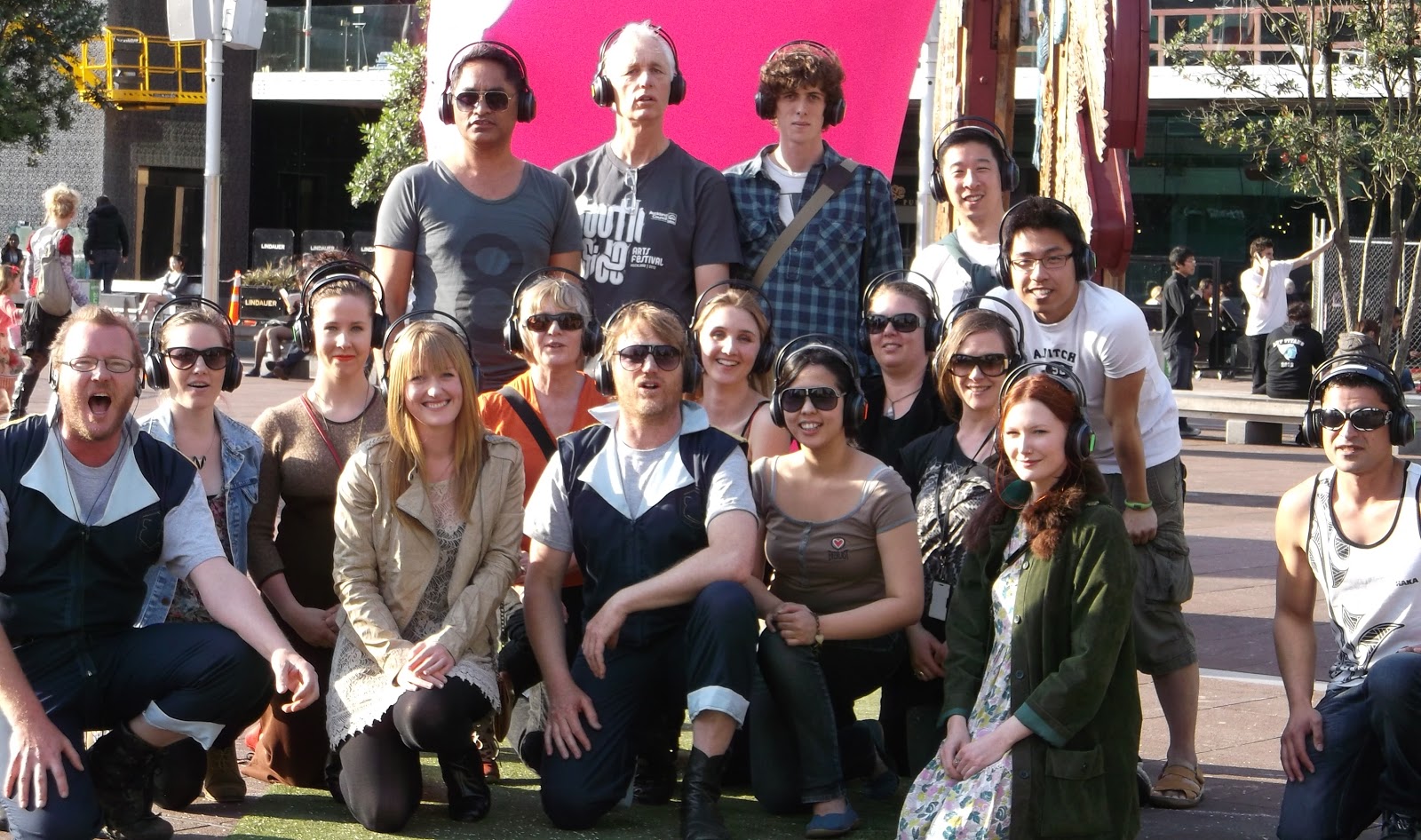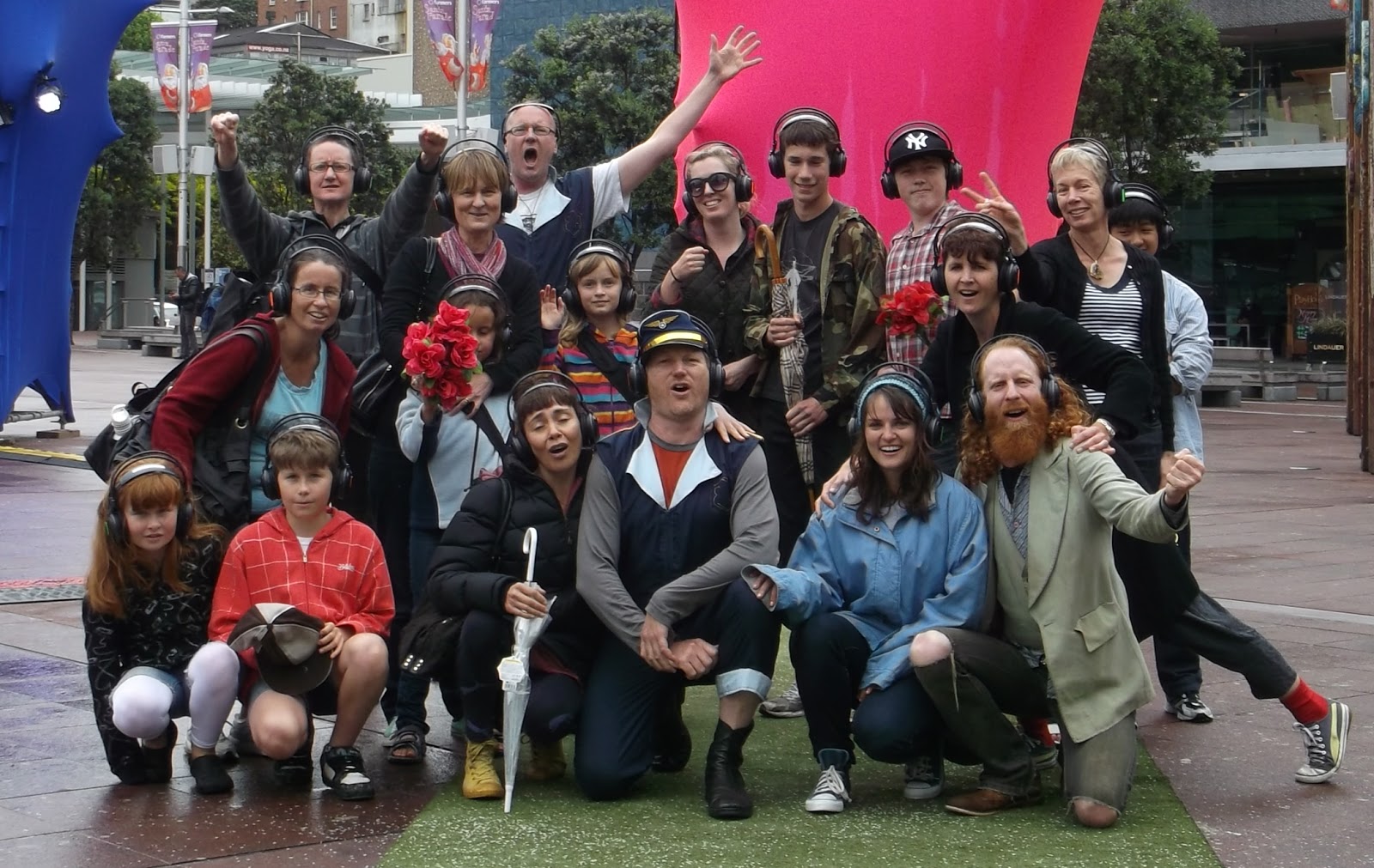Written for the Performing Arts Network New Zealand 2013.
Intimate Questions 2 is a public performance created by myself and Stephen Bain.

Future Hotel was created by myself, Nisha Madhan and Stephen Bain in an apartment in Paris is 2009. It is a network of artists whose acts of public intervention alter all known futures. By actively subverting the present, we create a dynamic void that unexpected futures may fall into.
IQ2 or Intimate Questions 2 is an interactive group questionnaire and public choreography. Participants answer a series of questions with simple movements creating a human pie chart of the personal, moral, and futuristic statistics of the group.
It’s a public and private personality test – private because the public don’t know what the performers are listening to and public on two counts: first, the performers didn’t necessarily realise that they would be performers, and second because they are publicly answering private questions about their lives.

And this is what, I believe, makes this piece deeply intertwined with the contemporary lives of New Zealanders. It’s made up specifically of their answers and responses to the questions we provide which address issues from economics, politics and health, to social behaviour and of course intimacy.
Using wireless headphones our participants are invited to answer a series of personality type questions with simple movements. Very simple, as in move the ‘yes’ sign or the ‘no’ sign.

Immediately we start to see some of the general statistics. 60 % of this group are women, 99% consider themselves honest people and 5% have knowingly lied on an official tax document. Incidentally, we also know that 2% of this group started the performance as strangers but continued an intimate relationship afterwards, undoubtedly due to the nature of the work. Unfortunately, it all ended over an argument about whether cats were better than dogs…which was not one of our questions.
From here, the questions get more complex and inevitably more intimate and we start to subdivide into further categories, agree, slightly agree, disagree, slightly disagree and a set of scale questions 1 through 10. The result is a human pie chart, or bar graph, which authentically represents the unique statistics, thoughts and feelings of that particular group.
We found that people were all too happy to follow these instructions and publicly answer our questions. And it’s simply because of the private nature of the headphones. They immediately put you in a secure space, in your own little world. And we are so used to them now as part of everyday life. We all know the feeling of walking along or running to the beat of a great song and feeling all of a sudden like we are the stars in our own movies. It’s like singing in the shower. Somehow you feel that no one is listening and that in fact, you really are quite good at this!

From here we start to take things a little further by having them answer questions with simple movements. Now the group have become unwitting performers in a public choreography. We even make them dance with each other as the questions are geared more and more towards intimacy. Are you looking for someone? Have you been waiting for someone to take you in to the future?
All the while the audience, the public on the street, are watching this with a soundtrack of their very own made up of a narrative about people lost in an airport, a collage of sounds about binary statistics, a documentary about the mating rituals of Ganets and original music by Jeff Henderson. It is timed perfectly to the headphones but the public is unaware of the questions being asked.

As we progress we see our participants start to pair off and walk down an aisle of astro turf towards the town hall. As bells ring on the outside soundtrack, our increasingly intimate questions on the inside soundtrack have led to one or more couples within the group playing out a mock wedding.
Finally, to further unify the group and really test out the singing in the shower theory, the group sings together karaoke style, and have their photo taken as a record and memento of the experience.
“IQ2 (short for ‘Intimate Questions’) is a public theatre piece that explores the divide between public and private senses of space.
“The performers unwittingly act out a scene of appearing lost in an airport, a journey through a space of transit, eventually finding each other. A triumphant finale finishes the piece, where all performers (some reluctantly) belt out Whitney Houston’s The Greatest Love of All.”– Elise Sterback – The Big Idea
My favourite thing about IQ2 is this: it’s an experience where strangers arrive alone, but leave together, having felt that they were a part of something. They leave having met each other, in fact they leave having danced together. Often with theatre experiences we arrive alone and leave alone and barely give a thought to the person sitting next to us, and how much can we even trust that person really?!
There was a man who held on to a plastic bag of bread, for the first half of the performance. It was obvious he was a bit of an outsider, but by the end he’d entrusted his possession to us and he had danced with a beautiful stranger and sung a song with a group of people and had smiled broadly when his was photo taken. When I asked him to write down his email address he wrote down an incomprehensible physical address which doesn’t exist. I wonder how many experiences he has where he truly gets to feel like he’s a part of a group. He was accepted in by total strangers. I absolutely love that we made him feel safe and trusted for… 25 minutes at least.

At its simplest, IQ2 is an experience that allows you to learn a few things about the people around you. It reminds me of this passage from an essay by Tim Etchells on Risk and Investment in the theatre
“Thinking of investment we ask: when this performance finishes will it matter? Where will it matter? Will the performer carry this with them tomorrow? In their sleep? In their psyche? Does this action, this performance, contain these people (and me) in some strange and perhaps unspeakable Way? I ask of each performance: will I carry this event with me tomorrow? Will it haunt me? Will it change you, will it change me, will it change things? If not it was a Waste of time.”
– Tim Etchells
I know for certain, that making this performance changed me, I’m sure it will change you.
At the very least, you be able to test out your shower singing talent for realises.
